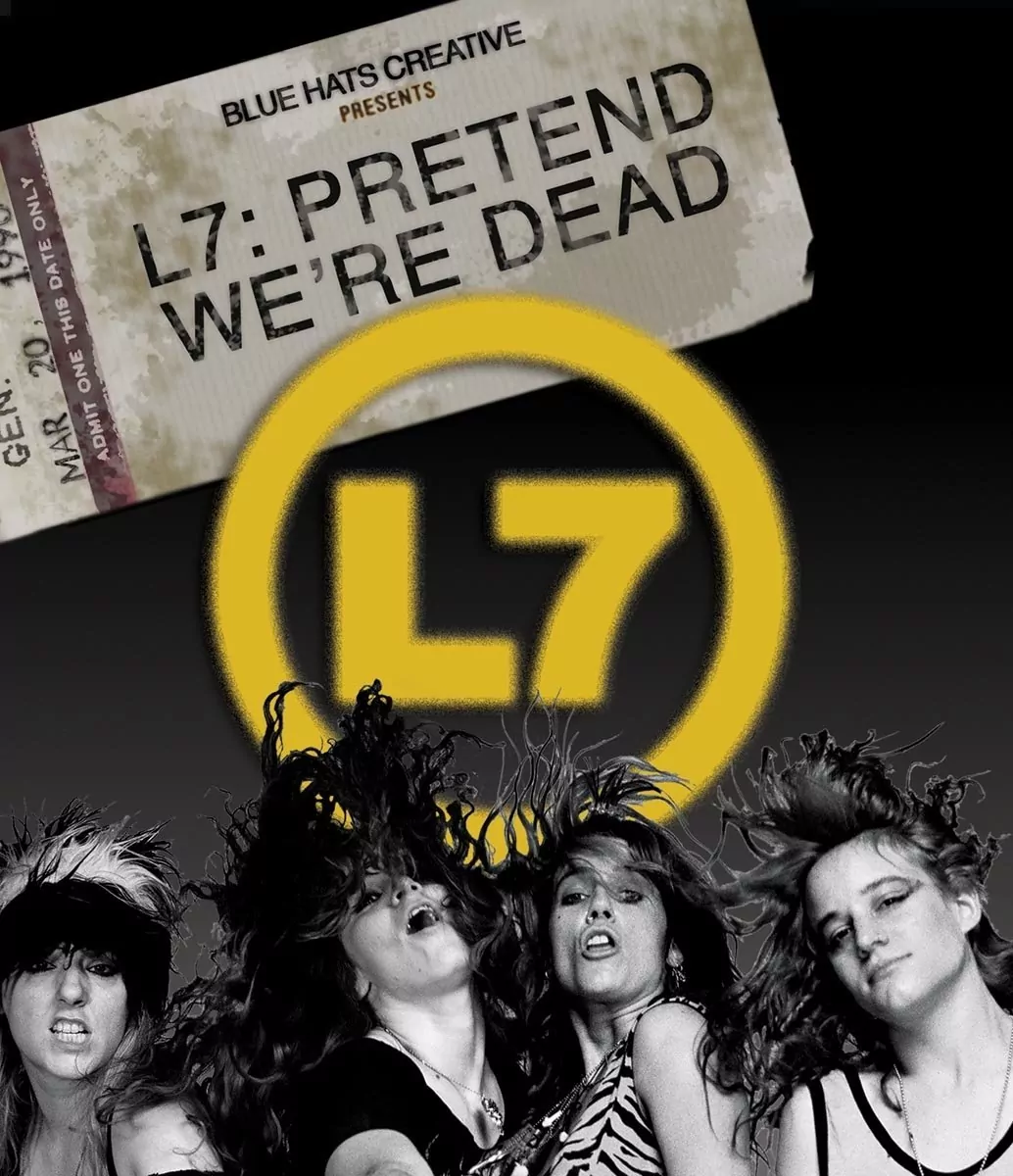
L7: Pretend We’re Dead
In 2016, the much-anticipated, kickstarter-funded documentary ‘L7: Pretend We’re Dead’, directed by Sarah Price was released to the delight of thousands of dedicated fans. The film follows the career of one of the great grunge-punk bands of the nineties.
An intro sequence featuring grainy film of turbulent crowds juxtaposed with candid footage of wild-eyed shenanigans sets the scene for the story of a band that practiced what they preached. The sweaty mosh-pits, head-thrashing performances, smashed windows and bawdy high jinks summarise a band who’s lives were, like their music, messy, raucous and drenched in a playful subversion of societal ‘norms’.

With the title borrowed from their most well-known track, the documentary is ironically constructed in a way which might imply it was put together posthumously. ‘Pretend We’re Dead’ sees the band narrating the whole tale of their “rag-to-riches-to-rags” journey off-screen. The director relies almost entirely on a bountiful supply of archive material to provide the visuals. Thankfully, all the members of L7 are in fact still alive today. They made a welcome return to the scene back in 2014 after their initial split in 2005.
The talking-head format isn’t forgone entirely, however. The audience is treated to brief interview snippets peppered throughout from a choice selection of celebrity fans and peers. Included amongst these are their one-time producer Butch Vig, his bandmate, Shirley Manson of Garbage, Allison Robertson of The Donnas, Joan Jett and ever so briefly, punk-vocal heavy-weight, Brody Dalle of The Distillers. It’s difficult to tell if this format was an artistic choice or born of circumstance. Still, the approach succeeds in stripping away some of the nostalgia which might have threatened to soften the impact of the band’s rebellious nature. We’re allowed to be fully immersed in their world as they experienced it at the time. It’s easier to picture the band as their fierce and driven younger selves when that’s all we’re allowed to see.
The other benefit of the unusual format is that it draws attention to just how special this material is. We’re presented with a treasure trove of vibrant archival evidence. The material lays bare the kind of chemistry oft sought but rarely found in young bands trying to make their mark on the world. Even for the first twenty minutes of the film when the story is painted largely through photographs, before the band bought their ‘brand new’ Hi-8 camera in 1991, their personalities were so large that they burst out of the pictures and the singular wavelength they all occupy is tangible.
We also get a real inside look at the lauded Seattle Grunge scene where the band first truly found their niche subsequent to vacating the LA art-rock scene.
“It was on fire…They were all PC and they were all feminists who were not threatened by us and thought we were cool and good. We were being accepted as a real fucking rock band”
Thanks to an invaluable collection of snapshots that picture the band hanging out, chilling, partying with and crashing on the floors of the likes of Mudhoney, Gwar, Lunachicks, Nirvana and countless more, it’s easy to get a real sense of the creative energy surrounding them at the time. The band’s reflections on the period, accompanied by such a rousing selection of photographic evidence made it easy to appreciate on a human level, the authenticity of the scene; a scene which genuinely seemed to be home to a bunch of mates hanging out, making music and having each other backs. ‘Authenticity’ is an important theme in the L7 story. As Donita Sparks comments, “Really we came with authenticity and I think that our generation was about identifying the authentic”. That statement really rings throughout the whole film; this band were heavy, they were visceral and they were above all else, real.
About halfway through, the eponymous narrators somewhat reluctantly broach the struggle the band had to avoid preconceptions based on their gender. Throughout their career they were inevitably plagued with questions about being ‘girls playing rock’.
“We really wished that gender would just go away – that we would be seen as rock musicians”
Personally, I’d prefer to discuss L7 without raising the subject of gender at all. It would be a disservice to the band however not to credit them for their contribution to changing the perceptions of women in rock. Their concerted efforts to cement their reputability within a male-dominated genre by subverting expectations of femininity, demonstrated to fans and record companies alike that women in rock could be cool-as-shit without shouldering the superficial burden of being “sexy” in the traditional sense.
“We were aware of the scrutiny that we were getting for being all gals…”
“I don’t know how to put this into words, I guess I have to just say it. You couldn’t be too sexy. If you were too fluffy or cutsie then you weren’t to be noticed as a musician”
Soundbites from male contemporaries giving credence to the band’s legitimacy can come across as a little patronising at times. Butch Vig describes them as having been an ‘anomaly’ for being “As heavy as the boys”. But L7 were not anomalous for being girls and playing heavy rock; there had always been girls who were just as heavy as their male contemporaries and demonstrated rocking-tha-fuck-out was not a gender exclusive pastime.
But as much as Janis Joplin, D’arcy Wretzky, Courtney Love, Patti Smith, Kim Gordon and their ilk had been holding their own as elected representatives of the XX chromosome combo, girls in general were always a minority in the rock scene. The real anomaly was that with the absence of a marketing agenda to be a ‘girl band’, in a genre where women often felt excluded and judged, four like-minded females ended up in the same band together. Beyond that turn of fate, however, they were just a band wanting to be judged on their merits. Disappointingly, what this documentary doesn’t quite make a big enough point of is just how progressive and unique they were musically. The terms ‘grunge’ and ‘riot grrl’ have been thrown around in relation to L7. In truth though, they pre-dated those genres and could be seen as having had a strong influence on both.
The focus of the film is largely on the career path of the musicians and reflections on each other’s nature. With the exception of a brief glimpse into the early life of Suzi Gardner, there’s no real mention of the member’s formative years. Equally, the history of the band pre 1990 (the band formed 1985) before the additions of Demetra Plakas and Jennifer Finch is only briefly touched on. We’re not really let into the more personal corners of any of the individual member’s lives and it’s only with the rather out-of-blue revelation of the death of Jennifer’s Dad that we’re reminded that the members even existed outside of the band. Nonetheless, the skin-deep recounting of the history is balanced out with charming glimpses of partying with Nick Cave, chilling with Dave Grohl and Tim Armstrong and surreptitious footage of Kurt Cobain casually picking nibbles out of L7’s rider backstage.
Overall it was well worth an hour and a half of my time to climb on board the wild ride that was L7. I found my appreciation furthered for an act that played as hard as they partied and used their clout to stand up for issues they cared about along the way. Though at times the unannounced switches between disembodied narrators can be a little disconcerting, for its flaws, ‘Pretend We’re Dead’ gives us a unique and exciting glimpse not only into the journey of a band whose influence is often overlooked but also into a legendary scene the impact of which was far-reaching.



